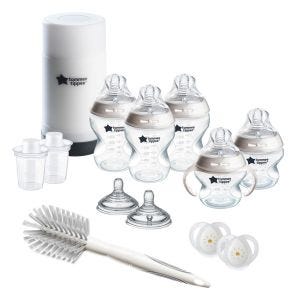
This is a demo store. No orders will be fulfilled.
Subscription orders can be cancelled at anytime. Free delivery on all subsequent subscription orders. Find out more about subscriptions.
They’re easy and fuss free
Your products are automatically sent to you
You save up to 10% when you sign up for a subscription
You can cancel at any time
Got questions about cluster feeding? We've got the answers. Find out everything you need to know about what cluster feeding is, why babies cluster feed, and how you can make it work for you.
Cluster feeding is when babies want to feed more frequently - in ���clusters��� - over a shorter period of time. Cluster feeding differs from your baby's normal breastfeeding behavior and can often last up to a couple of hours at a time.
In the first few days before birth your body provides colostrum for your baby which is rich in nutrients and it supports your baby's immune system and improves gut function. Whilst baby is taking in this goodness by suckling at the breast this triggers the production of breastmilk which will continue to provide all the nutrients your baby needs as well as more volume. All of this sucking at the breast encourages mums milk production system as it is a supply and demand system - no sucking (demand) from baby - no milk supplied.
Once your milk volume has arrived your baby should have a few days of being nice and settled and sleeping soundly for a couple of hours between each feed. Then you will notice that your baby suddenly starts wanting to feed more frequently. This is a good sign that your baby has grown. What does a bigger baby need? More milk! How does a baby get mum to produce more milk? By placing more demands on mum with more frequent feeds.
After a couple of days of the increased feeding the supply will change and the composition of the milk alters to meet the needs of your growing baby. There follows a few of days of being nice and settled and sleeping soundly for a couple of hours before each feed. Then you will notice that your baby suddenly starts wanting to feed more frequently. This is a good sign that your baby has grown. What does a bigger baby need? More Milk! How does a baby get mum to produce more milk? By placing more demands on mum with more frequent feeds. And so it goes on...
The most important thing to remember about cluster feeding is that it's not a cause for concern - in fact, it's completely normal behaviour. And is actually a sign that feeding is going really well.
It's not always easy to figure out whether your baby is cluster feeding, as newborn babies don't always have predictable eating or sleeping schedules to begin with.
If your baby is cluster feeding, they may want to eat constantly, but only in short bursts each time. They will also show signs of hunger - like crying, but will appear content once they're being fed.
It's natural to wonder whether your baby has colic when they are much fussier and harder to soothe than usual. Knowing the differences between colic and cluster feeding can help you know how to make things better for your baby.
Colic is usually defined as a minimum of three hours of crying for at least three days a week. A baby with colic usually can't be soothed by feeding, whereas a baby that is cluster feeding can.
For mums, cluster feeding can be quite an emotionally and physically draining process, that's why taking care of yourself is vital for both your welfare and your baby's.
To help make cluster feeding easier for you, make sure that you are:
Make yourself as comfortable as you can, pick out a new series on Netflix or grab a good book so you have something to keep you going through all those feeding sessions.
It's also good to switch up feeding positions so that you don't get sore.
Your cluster feeding questions asked and answered...
It's natural to worry whether your milk supply is low if your baby is fussy and cluster feeding. However, it's highly unlikely that's the case. If your baby is providing wet and dirty nappies, is gaining weight and wakes independently for their own feeds you can rest assured your baby is getting enough milk.
If you are still concerned that your baby isn't getting enough milk, or if your baby has been cluster feeding for more than a few days, we recommend consulting your GP or another health professional.
Cluster feeding isn't a sign that need to start supplementing with formula. Supplementing breast-fed babies with formula can stall your milk production and disrupt your baby's nutrition intake.
Although every baby is different and ���normal��� is a relative term, typical feeding sessions for babies who aren't cluster feeding tend to range from 10 to 30 minutes. Experts recommend feeding newborn babies between 8-12 times within a 24-hour period.
Periods of cluster feeding can last up to a couple of days and often follow a period of growth. As your baby gets bigger its instinct is to ask for more food!
Cluster feeding rarely lasts for more than a couple of days. If your baby has been cluster feeding for more than 3 days, be sure to check their weight to make sure they are getting enough food.